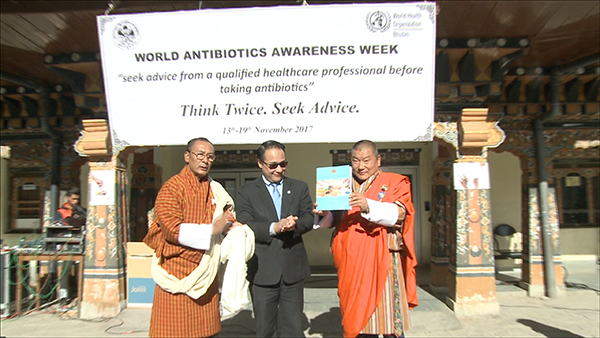 Bacteria developing resistance against antibiotics is becoming a major public health concern globally. Though the concern is not so serious in Bhutan, the country has come up with an action plan to combat antimicrobial resistance.
Bacteria developing resistance against antibiotics is becoming a major public health concern globally. Though the concern is not so serious in Bhutan, the country has come up with an action plan to combat antimicrobial resistance.
The National Action Plan for Antimicrobial Resistance was launched today as Bhutan joined the global community to mark the beginning of the World Antibiotics Awareness Week in Thimphu.
Under the action plan, the national antibiotic guideline will be reviewed and updated based on the antimicrobial resistance pattern in the country. It is all aimed at promoting rational use of antibiotics.
The earlier guideline developed in 2007 and revised in 2012 was adapted from the international guidelines and do not include the antimicrobial resistance pattern in the country.
“A lot of activities have been carried out in regards to combating antimicrobial resistance but all were done by different stakeholders without consultation,” said Ugyen Tashi, the Programme Officer with Department of Medical Services of the health ministry.
“But with this national action plan, we are hopeful that all concerned stakeholders will be brought together. The action plan itself was developed after consultation with various stakeholders like Drug Regulatory Authority, BAFRA, Department of Livestock, and many other agencies. The action plan has around seven objectives, which includes awareness programme and capacity building of the professionals.”
The action plan will also strengthen antibiotics regulatory system. It will restrict use of antibiotics in animal feeds and other non-therapeutic uses. “In animals, incomplete course of the treatment and also sub dose of the antibiotics causes resistance,” explained Nirmal Kumar Thapa, an Animal Health Specialist with the Department of Livestock.
“The other is use of antibiotic in the animal feed as growth promoter. This too leads to antibiotic resistance. If an animal is harboring resistant bacteria or pathogens, it becomes difficult to treat the animal and the disease can spread to other animals.”
The action plan will also make antimicrobial resistance part of university curriculum. Trainings will be provided to in-service professionals and awareness campaigns will be held for public awareness.










